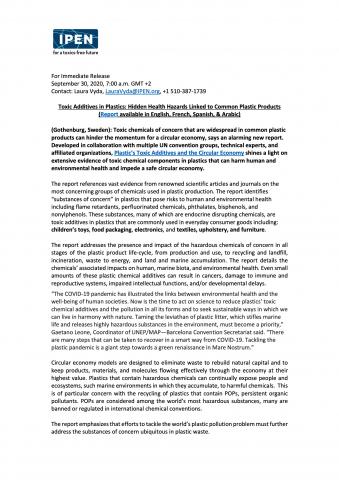Toxic Additives in Plastics: Hidden Health Hazards Linked to Common Plastic Products

(Gothenburg, Sweden): Toxic chemicals of concern that are widespread in common plastic products can hinder the momentum for a circular economy, says an alarming new report. Developed in collaboration with multiple UN convention groups, technical experts, and affiliated organizations, Plastic’s Toxic Additives and the Circular Economy shines a light on extensive evidence of toxic chemical components in plastics that can harm human and environmental health and impede a safe circular economy.
The report references vast evidence from renowned scientific articles and journals on the most concerning groups of chemicals used in plastic production. The report identifies “substances of concern” in plastics that pose risks to human and environmental health including flame retardants, perfluorinated chemicals, phthalates, bisphenols, and nonylphenols. These substances, many of which are endocrine disrupting chemicals, are toxic additives in plastics that are commonly used in everyday consumer goods including: children’s toys, food packaging, electronics, and textiles, upholstery, and furniture.
The report addresses the presence and impact of the hazardous chemicals of concern in all stages of the plastic product life-cycle, from production and use, to recycling and landfill, incineration, waste to energy, and land and marine accumulation. The report details the chemicals’ associated impacts on human, marine biota, and environmental health. Even small amounts of these plastic chemical additives can result in cancers, damage to immune and reproductive systems, impaired intellectual functions, and/or developmental delays.
Read the full text of the press release using the links below.
